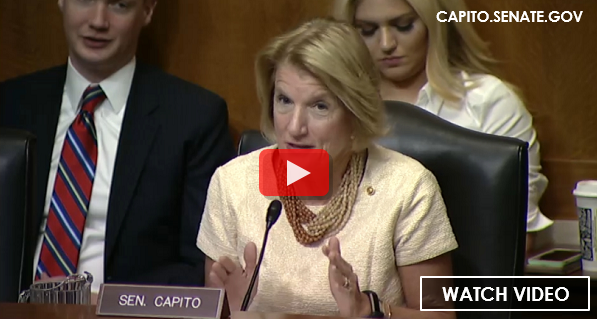WASHINGTON, D.C. — U.S. Senator Shelley Moore Capito (R-W.Va.), chairman of the U.S. Senate Environment and Public Works (EPW) Committee’s Clean Air and Nuclear Safety Subcommittee, presided over a hearing focused on clean energy technologies. Brian Anderson, director of the West Virginia University Energy Institute, and other witnesses testified on their research and work to develop advanced power generation technologies that improve air quality and reduce carbon emissions.

Watch a video of Senator Capito’s opening remarks here. A PDF is available here.
More information on the hearing and witness testimony are available here.
Opening remarks as prepared for delivery:
Our hearing today will provide an opportunity for the members of this Subcommittee to learn more about advanced power generation technologies that will improve air quality and reduce carbon emissions. The development and commercial deployment of these technologies will inform this Committee’s consideration of clean air and nuclear safety regulatory and legislative proposals, and oversight of related agencies.
Our panel of expert witnesses have a diverse and deep wealth of experience dealing with research and development of advanced coal and nuclear technologies across the private and public sectors and academia.
I am particularly happy that Brian Anderson, Director of the Energy Institute at West Virginia University has joined us today. Dr. Anderson is extremely knowledgeable on fossil technology research, development, and commercialization across academia, the national lab system, and the private sector. I look forward to hearing his insights.
The federal government has played a role in incubating important energy technologies for decades, with a goal of commercial viability. These days, this development in coal and nuclear technologies is as important as ever.
The coal-fired and nuclear power generation sectors provide the core of this country’s baseload electricity, and both are under serious pressure as the result of a confluence of regulations, electric market inefficiencies, and competition from cheap natural gas. Plants powered by both fuels are currently either being shuttered or pushed beyond their original planned ends of life – at the cost of foregone investment, lost jobs, higher electric rates, and economic harm to upstream and downstream industries.
However, there is no clear, reliable baseload alternative to these technologies at present.
New, high-efficiency coal plants with cleaner emissions streams to facilitate carbon capture and utilization, the development of advanced carbon-based materials and manufacturing processes, and the deployment of advanced nuclear reactor designs that are safer and more efficient than the Cold War-era designs they will replace are all essential development to ensuring the reliability of the grid.
The United States has vast and diverse energy resources and a deep well of scientific and engineering talent.
But instead of using those assets to great effect, over the past several years we have let those skills atrophy, leaving the major advances in these markets to foreign competitors due to a lack of policy vision.
As we consider agency regulations and congressional legislation dealing with emissions standards and energy permitting, we must consider whether we are “protecting” ourselves into harm’s way.
If the federal government is funding advanced fossil and nuclear technologies with an eye to getting these designs into the marketplace, but is simultaneously creating regulatory structures that are not flexible or expeditious enough, we may actually smother those taxpayer investments in the crib.
This will be a negative feedback loop as unrealized reductions in emissions drive demands for tighter regulations.
West Virginia has both a great story to tell when it comes to the research and development of this technology and a great deal at stake when it comes to the future of energy markets and regulation.
West Virginia is a major exporter of energy, including electricity, to neighboring states and that sector is under significant pressure.
The state is home to West Virginia University, which Dr. Anderson is representing, and the National Energy Technology Laboratory in Morgantown.
Their presence has also attracted innovative energy and manufacturing companies researching more efficient power plant designs, fuel cells, carbon capture technologies, and other technologies that will contribute to a manufacturing renaissance achieved with lower emissions of carbon dioxide and air pollutants.
Given the stakes of this policy debate for West Virginia and the entire country, Congress must be well-informed about the development of new technologies in these fields, what they can and cannot deliver in terms of efficiencies, and how realistic their commercial viability.
That is the only way we can craft legislation and conduct meaningful oversight of federal agencies to achieve the best outcomes for American workers, families, and environmental quality.
Today’s hearing will support that mission by giving voice to a panel of this nation’s foremost experts in the field. I look forward to hearing from our witnesses and the dialogue with our members.
# # #